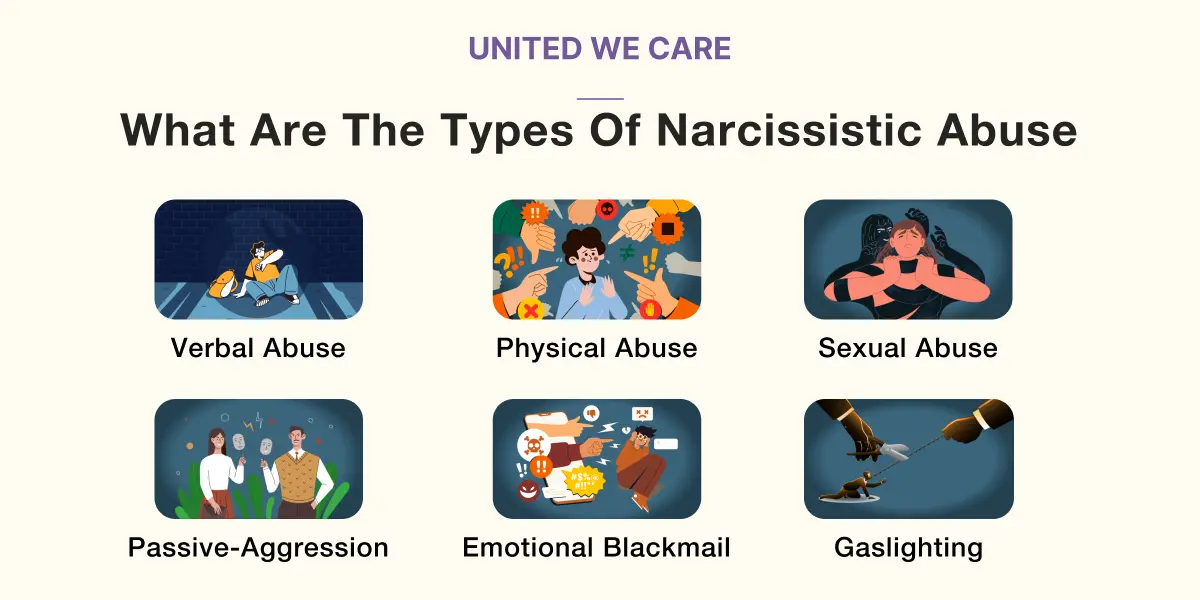Introduction
Narcissistic abuse is a specific type of emotional abuse characterized by emotional blackmail, gaslighting, and coercion. If prolonged, it can also turn physical and sexual. It is termed narcissistic abuse because this particular type of exploitation stems from narcissistic tendencies of behavior.
Typically, the abuser is a person with little to no empathy for others, along with extremely volatile and manipulative behavior patterns. In this article, we will describe the examples, signs, and effects of narcissistic abuse.
What is Narcissistic Abuse
Due to its insidious nature, narcissistic abuse is often unrecognized and unreported. Often, the survivors of this kind of abuse lack the vocabulary to express what is happening to them. Essentially, narcissistic abuse is persistent physical and psychological aggression, coercion, social isolation, and financial exploitation throughout a relationship [1].
It can occur in any type of relationship, such as parent-child, employee-employer, teacher-student, but most commonly in intimate relationships. Typically, the abusive relationship forms a consistent power dynamic between the abuser and the survivor.
Mostly, narcissistic abuse is hard to identify because these relationships tend to oscillate between extremely good and bad moments. There are distinct stages to narcissistic abuse: an initial “love bombing” phase, isolation from other relationships, and then exploitation.
The abuse ultimately leads to a loss of independence and agency, causing a detrimental effect on them in most areas of their lives, i.e., mentally, physically, socially, sexually, spiritually, and financially.
Types of Narcissistic Abuse
Narcissistic abuse can take any of the following forms. Usually, it is a combination of all forms, with emotional abuse being more frequent.

Verbal Abuse
One type of emotional abuse involved in this phenomenon is verbal abuse. This includes yelling, berating, and humiliating someone using words and verbal expressions. This is relatively constant and shows up whenever the narcissist is feeling negative emotions.
Physical Abuse
Physical abuse, such as hitting, restraining, and causing physical pain, is more of a reserve attack. The narcissist only uses this form of abuse in extreme cases. Otherwise, simply the threat of this abuse suffices as a means of controlling the person being abused.
Sexual Abuse
Unfortunately, many instances of narcissistic abuse also include sexual assault. This can be in the form of objectification, molestation, harassment, and even rape. Sexual abuse can also happen without touch through non-consensual exposure to pornographic material, the clicking of inappropriate photographs, and humiliation through forced nudity.
Passive-Aggression
Passive aggression is the most common weapon in narcissistic abuse. It takes the form of sarcasm, taunts, stonewalling, and silent treatment. Primarily, this happens because narcissists tend to express their negative feelings indirectly instead of addressing them openly.
Emotional Blackmail
Emotional blackmail is when someone gets you to do what you wouldn’t normally do by eliciting unpleasant emotions. These feelings can be described using the acronym FOG. Fear, obligation, and guilt are the weapons used to coerce using emotional blackmail.
Gaslighting
Finally, the reason why narcissistic abuse is so insidious is because of the use of gaslighting. This is a specific type of manipulation that causes a person to question their own reality. Constant invalidation and deflection of a person’s needs and demands can lead to gaslighting.
Symptoms of Narcissistic Abuse
Generally, narcissistic abuse leads to severe psychological harm with long-term repercussions [2]. Here is an extensive yet not exhaustive list of symptoms of narcissistic abuse.
- Recurring feelings of confusion
- Self-blame and self-doubt
- Anxiety and uncontrollable thoughts
- Feelings of helplessness and hopelessness
- Rumination and difficulty letting go of the past
- Social isolation and alienation
- Chronic shame
- Difficulty managing interpersonal relationships
- Self-sabotaging behavior
- Intrusive thoughts, images, and emotional flashbacks
- Difficulty regulating emotions
- Uncontrollable crying
- Frequent freeze response
- Inappropriate anger and outbursts
Examples of Narcissistic Abuse
Here are a few examples of narcissistic abuse in three possible scenarios. Bear in mind that narcissistic abuse can occur in any relationship, but these three are the most common.
Scenario 1: Romantic Relationship
The narcissist first starts with love-bombing by mirroring the personality of the victim. This means that they make the other person feel like they are their soulmate and no one loves them more. Once they reach this level of trust and connection, they coerce the person to cut off all other relationships and isolate. Then, the exploitation and gaslighting begin in full force.
Scenario 2: Parent-Child Relationship
The narcissistic parent never sees the child as an individual with their own needs and desires. Instead, the child is seen as an extension of themselves and put under a lot of pressure to meet the parent’s expectations. However, no matter what the child does, it is never enough, and they are constantly invalidated.
Scenario 3: Boss-Employee Relationship
In this scenario, the boss puts unrealistic expectations on the employee, demanding a lot of work with very little guidance. Instead, there is persistent criticism, an unhealthy work environment, and frequent humiliation.
Brain Damage from Narcissistic Abuse
Narcissistic abuse is actually very serious and can cause long-term consequences that hamper health and well-being. Many of these effects also involve damage to how the brain and nervous system work.
Complex PTSD
Complex PTSD is a more severe kind of posttraumatic stress disorder that is often caused by narcissistic abuse. This mental health condition is characterized by intrusive flashbacks, hypervigilance, dissociation and numbing, low self-worth, and poor interpersonal relationships. Each of these is caused by changes to how the brain and nervous system work.
Cognitive Decline
Narcissistic abuse also takes a toll on a person’s access to their cognitive abilities. Memory, concentration, problem-solving, decision-making, and executive functioning suffer and continue to decline even after the abuse stops.
Physiological Impact
Primarily, everything in a person’s functioning that is affected by narcissistic abuse is based on physiology. Experts say that trauma exists more in the body than in the mind. The nervous system experiences prolonged dysregulation, which affects the function of neurotransmitters, hormonal systems, the autonomous nervous system, and the body’s flight, fight, freeze, and fawn responses.
Impacts of Narcissistic Abuse
The effects of narcissistic abuse were aptly worded as fatal or extremely debilitating, long-lasting by researchers [3]. Individual recovery becomes an incredibly complex and time-consuming process because of how narcissistic abuse erodes and annihilates a person’s sense of self. Furthermore, a person often stays stuck in a narcissistic relationship because this pervasive impact makes it impossible for one to leave.
Understandably, this difficulty becomes sevenfold when the narcissist and the survivor are related by blood. Nevertheless, even after severing ties, the negative effects of narcissistic abuse are immense and continue long after the relationship has ended [1].
Therapy for Narcissistic Abuse
Fortunately, recovery is possible, and one can eventually grow to become a healed and authentic self after narcissistic abuse. Nonetheless, it is imperative to understand that recovery is a long process, often self-directed, and requires professional help.
It is crucial to find the right kind of mental health professional to overcome the effects of narcissistic abuse. One needs to consult a trauma-informed therapist who understands the nature of this abuse.
If required, an individual can also take support of pharmacotherapy using antidepressants and anti-anxiety medication. Moreover, it is recommended to have a body-based intervention as well, such as somatic therapy, restorative yoga, tai chi, dance/movement therapy, etc.
Conclusion
Narcissistic abuse should not be taken lightly. It is a deeply disturbing and insidious type of abuse that has enduring consequences even after escape from the narcissist. The impact of narcissistic abuse typically also includes brain damage and a physiological aftermath.
Recovery, though possible, is a complicated process that needs to be done with the right professional help. You can speak to our experts at United We Care for the right guidance and find yourself the most appropriate therapist.
References
[1] Elise, S., 2018. Experiences of narcissistic abuse: an exploration of the effects on women who have had a long term, intimate, relationship with a suspected narcissistic male partner.
[2] Upton, S., Narcissistic Abuse Research.
[3] Shalchian, S., 2022. Clinician’s Recommendations in Treating Victims and Survivors of Narcissistic Abuse.
[4] Howard, V., 2019. Recognising narcissistic abuse and the implications for mental health nursing practice. Issues in mental health nursing.










